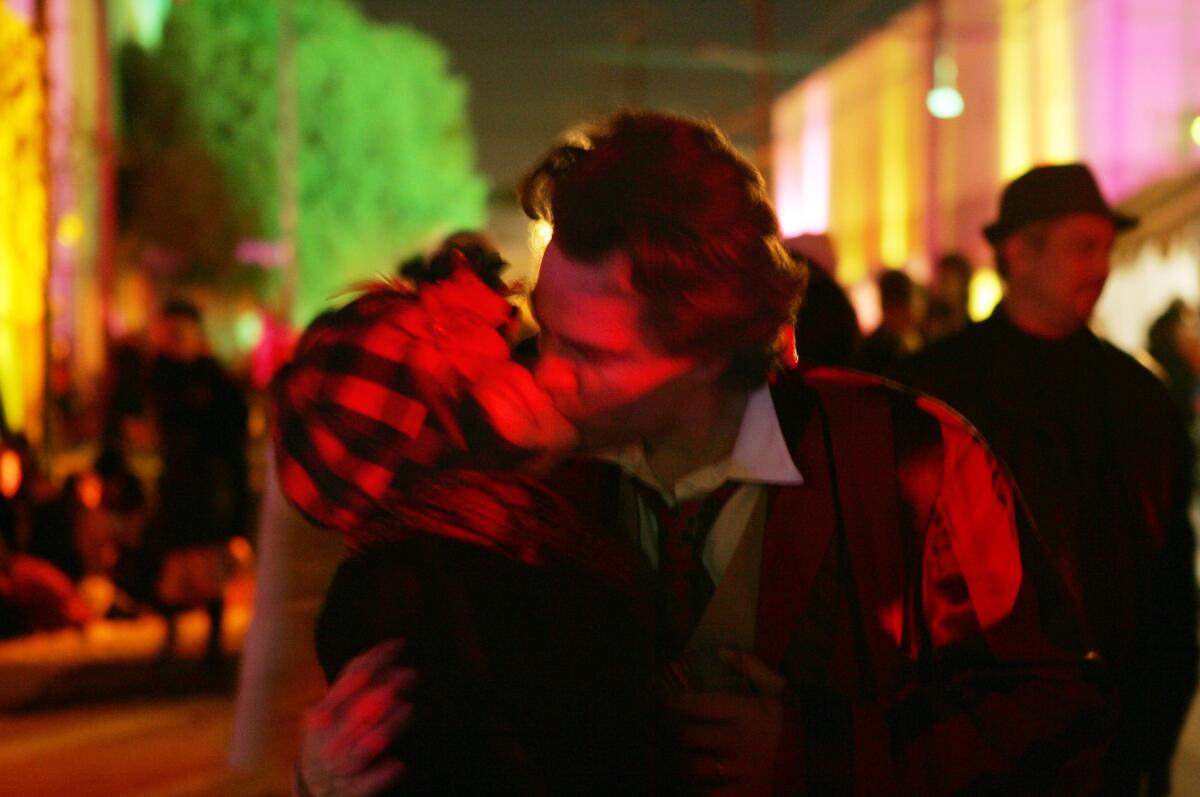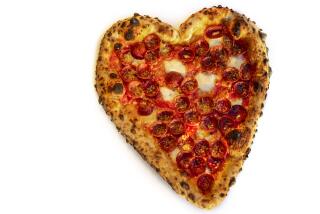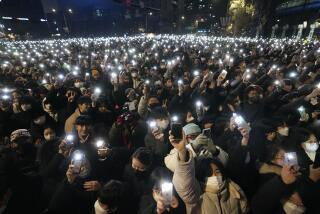Two sexperts tell us: Which Valentine’s Day rituals actually work?

A couple shares a spontaneous moment of love in the street during the Lucent L’ Amour street festival held the night of Valentine’s Day in downtown Los Angeles on Feb. 15, 2009.
- Share via
According to one survey, nearly 85% of respondents said having sex was an important part of Valentine’s Day.
That’s a lot of pressure.
“We live in a country where sex ruts are epidemic,” says licensed psychotherapist and sexuality counselor Ian Kerner. “Some estimate that nearly 40 million Americans are in sex-starved relationships.”
We interviewed two “sexperts” — Kerner, author of “She Comes First: The Thinking Man’s Guide to Pleasuring a Woman,” and relationship coach Lonnie Barbach, author of “Going the Distance: Finding and Keeping Lifelong Love” — to learn the hot-and-heavy truth about which common Valentine’s Day rituals will hurt, or help, your romantic chances.
A rich dinner
“A romantic meal together, whether out or home-cooked, can be intimate and connecting,” Kerner says. But go light: “Heavy meals get in the way of sexual intimacy.”
Wine and bubbly
“A little wine and Champagne goes a long way in terms of helping you to relax and lowering inhibitions, but regardless don’t overdo it,” says Kerner. “Too much alcohol depresses the nervous system, slows down responses and contributes to sexual dysfunction.”
What about oysters? And chocolates?
Sorry, but the U.S. Food and Drug Administration says there is no scientific evidence that raw oysters are an aphrodisiac. And Kerner says, “Some ingredients in chocolate have been linked to neurotransmitters released during sex, but this is correlation more than causation. The brain is the biggest sex organ, so eat what’s sexy to you.”
Candlelight?
This one is a no-brainer. Absolutely. (Unless your partner hates candlelight.)
Sexy underthings?
Barbach and Kerner suggest going lingerie shopping together. “That can be a sexy, fun adventure that builds anticipation and desire,” says Kerner. “Sometimes sexy lingerie also helps bring out a different sexual part of yourself.” (Bonus: You avoid that horrible moment when you discover the item you bought was too small or … too big.)
See the most-read stories in Life & Style this hour >>
But, I’m too tired …
Despite the findings of the aforementioned survey that Kerner did along with an assistant professor at the University of Kentucky, remember: Nothing is mandatory on Valentine’s Day. And if your partner is exhausted after an especially busy workweek, the most romantic thing in the world might be clearing the way (example: taking the kids to a movie) so that he or she can get to bed early for a good night’s sleep.
Finding the perfect gift
“The senses are important pathways to arousal: Sight, sound, touch, taste, smell. Appeal to all the senses if you can,” says Kerner. “Fresh cut flowers, whether roses or not, appeal to visual and olfactory pathways.” Adds Barbach: “The challenge is to give your partner the gift they want rather than the gift you want to give them. You are showing your love by understanding who your partner is. Some people may want a material gift, some may want the gift of time or something homemade.... At some point you need to ask. It’s important to talk with one another and learn what makes your partner tick.”
The No. 1 rule? Be sensitive
“Romance is more about how you feel about something, the meaning you attach to it,” says Barbach, who advises being considerate: If your partner is on a diet, skip the high-calorie gifts and dinner plans in favor of a calorie-free sunset walk on the beach. That can score you way more points (and save you more money) than a fancy dinner.
And some parting words of relationship wisdom …
Don’t put too much pressure on yourself. “Valentine’s Day should not be a source of pressure,” Kerner says. “To me, it’s an opportunity to prioritize connection and intimacy.... Studies show the difference between couples who succeed and fail is the ratio of positive to negative interactions. Ideally, you have a 5-to-1 ratio of positive to negative. At minimum, Valentine’s Day is an opportunity to bank some positivity.”
To read the article in Spanish, click here
MORE
Valentine’s day recipes, restaurants and treats
Make this chocolate layer cake from Proof Bakery
Valentine’s Day: 43 great recipes for two






